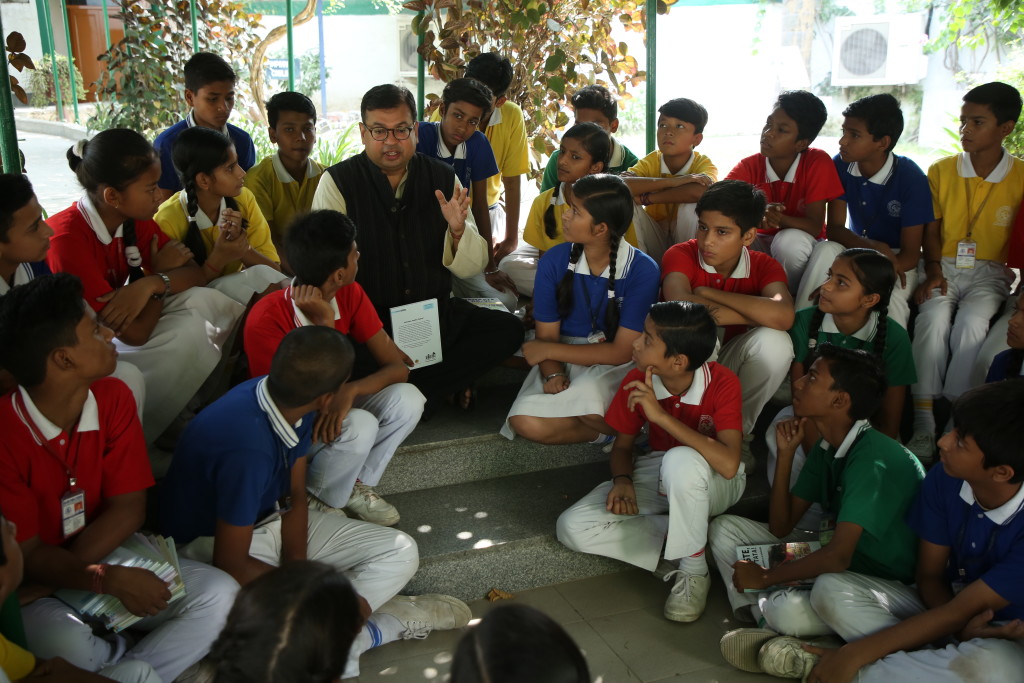
Sunoor is seen here narrating Dr Bindeshwar Pathak’s inspiring story to Sulabh International School students in Palam. Sunoor is the founder and series editor of the Namaste Series! a project that captures the inspiring journey of s/heroes from the global south and turns them into story books.
Published by Radio Nepal on 18 March 2023
Unreasonable screentime threatens children’s mental and physical well-being and is a significant parenting challenge today! According to the World Health Organization (WHO), 10% of youngsters over the globe suffer from mental problems. This is especially troubling, considering that childhood and adolescence are crucial periods for mental health. The brain undergoes significant growth and development during this period. Children and adolescents develop cognitive and social-emotional skills that influence their future mental health and are crucial for adopting adult roles in society.
Early adverse experiences in homes, schools, or digital places, such as exposure to violence, the mental illness of a parent or other caregiver, bullying, and poverty, raise the likelihood of developing mental illness. In addition, too much time spent in front of a screen has been related to sleep deprivation, speech delays, poor social skills, and other life issues. When screentime becomes an all-consuming pastime for youngsters, this is dubbed screen addiction.
What is unreasonable screentime and screen addiction?
Screen addiction describes the compulsive and excessive use of electronic devices such as smartphones, tablets, and laptops. While technology has undoubtedly made our lives easier, it has also had several detrimental implications, notably regarding mental health. Children are vulnerable to screen addiction, which can harm their mental health.
Addiction symptoms include the inability to stop taking the substance or when the substance’s use begins to interfere with one’s life or relationships. The symptoms are identical when it comes to youngsters and screens.
How does screen addiction impact health?
The increased risk of developing anxiety and despair is one of the most significant ways that screen addiction impacts children’s mental health. Excessive screen usage is related to elevated levels of stress, anxiety, and depression in youngsters, according to research. This is due to several factors, including the social isolation that frequently results from excessive use of electronic devices, the overstimulation of the brain that occurs when children are exposed to an excessive amount of visual and auditory stimuli, and the disruption of sleep patterns that can arise when screens are used too close to bedtime.
Your child’s danger of being exposed to cyberbullying and pornographic material increases as they spend more time on phones and other screens. Similarly, more time spent on social media is frequently associated with sadness and internalizing issues. In addition, spending more time in front of a screen is associated with a decrease in parental bonding, according to scientific research.
The negative impact of unreasonable screentime on Physical Health
In addition to harming children’s mental health, screen addiction can negatively impact their physical health. For instance, children who spend an excessive amount of time seated in front of screens are at risk for acquiring obesity, which is related to a variety of physical and mental health issues. In addition, excessive screen time can result in eye strain, headaches, and other physical pain, exacerbating stress and anxiety.
Reducing screen time for children can be challenging, mainly when screens are often used for entertainment and educational purposes. However, here are some practical tips for reducing screentime for children.
What can parents do to manage screen time for children?
Parents and caregivers must actively supervise their children’s screen time to reduce their excessive use of electronic devices. Establishing explicit guidelines and limits for screen use is one approach to this. For instance, parents may limit screen usage to a set number of hours per day or require screens to be turned off at least one hour before bedtime.
Key Tips
- Use parental controls on the devices: Parental controls can effectively limit screentime and restrict access to certain apps or websites. Parents can use parental control features on devices or install third-party apps to help monitor and control their children’s screentime.
- Encourage youngsters to participate in activities that support their physical and mental health as another method for reducing screen addiction. This could be outdoor play, reading, artistic pursuits, or time spent with friends and family. In addition, parents may limit the amount of time their children spend in front of screens and create healthy behaviours by encouraging their children to participate in these activities.
- Establish tech-free zones at home: Establishing tech-free zones in the home, such as the dining table or the bedroom, can aid in reducing the amount of time youngsters spend in front of devices. In addition, to foster more face-to-face engagement and family time, parents can advise youngsters to leave their devices in another room during these times.
- Finally, parents may exhibit responsible screen use. Children typically emulate their parents’ behaviour; therefore, if parents are constantly checking their phones or watching television, it is conceivable that their children will do the same. By demonstrating appropriate screen usage, parents can provide a positive example for their children and encourage the development of mental and physical health-promoting activities.

Encourage youngsters to participate in activities that support their physical and mental health as another method for reducing screen addiction. This could be outdoor play, reading, artistic pursuits, or time spent with friends and family.
Action points for advocacy organisations
Organisations advocating for children’s mental health need to develop new strategies to integrate screentime advocacy into their mandate. Similarly, strategic partnerships in the public and private sectors must be established to address the growing challenge of screen addition.
Published by Radio Nepal on 18 March 2023
About the Author
Dr Sunoor Verma is a global health practitioner. He has advised WHO, UNICEF, UNHCR, HUG-Geneva and Cambridge University on Strategy, Leadership Communication, Advocacy and Resource Mobilization. He has set up and led the country and regional operations for the European Centre for Minority Issues in the Balkans. He has supported track two peace processes in Macedonia, Kosovo and Sri Lanka and emergency response to the Tsunami, Avian Influenza and COVID-19. He has taught Global Health at Boston University. He has curated partnership initiatives with Macedonia, Kosovo, Germany, Switzerland, Australia, and Nepal parliamentarians. He divides his time between the foothills of the Jura Mountains in France and Buddhanilkantha in Nepal.
Additional Resources
- Here is a fantastic article with a step-by-step “How to.. ” Guide to screen addictions and responsible digital use by Holly Nibllet. In this article, the author discusses the advents in technology and how to control mobile screen time. How COVID-19 has changed our viewing habits, along with screentime data for children from the UK, is presented.
- Published in 2019 is another practical guideline Digital Guidelines: Promoting Healthy Technology Use for Children by the American Psychological Association.
- The American Academy of Pediatrics has established recommendations for children’s media use. Their current recommendations advise:
- For children under 18 months, avoid screen-based media except video chatting.
- For children 18 months to 24 months, parents should choose high-quality programming and watch with their children.
- For children 2 to 5, limit screentime to one hour per day of high-quality programming.
- For children 6 and up, establish consistent limits on the time spent using media and the types of media.
- A documentary worth watching is by Carlota Nelson, director of the documentary Brain Matters, which explores why too much screentime can harm babies and the importance of ensuring children enjoy off-screen experiences. Also, check out her engaging interview on the thinking behind this film.